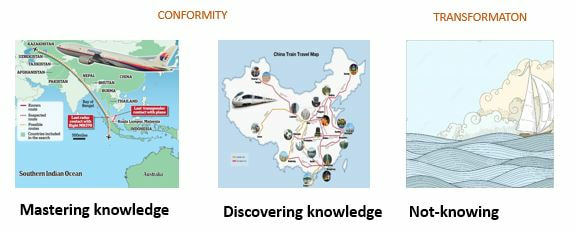|
We have been thinking about the different purposes of education. This is important when we consider the provision of an educational system that might go some way to prepare students for the complexities of 21st century living and working. This has led to us to model how an idea of transformation sits alongside conformity in educational provision. Although we have conceived of these models in light of our own research within schools, they have a relevance to questions concerning the ways in which values and knowledge are transmitted within Higher Education (HE) too. For example, the University of Sussex, where we both teach and research, has recently set out its new strategic framework, A Better University for A Better World, in which it commits to a curricular framework that is ‘disruptive by design’ where students are enabled to become ‘critical thinkers, entrepreneurs, commentators, citizens and activists’. Two of the educational models we set out relate to ideas of what we are calling ‘conformity’ in knowing things (i.e. knowledge acquisition of curriculum content and behaviours understood as important for learning). They are dominant models in educational thinking and have a global reach. They rely on ideas of ‘mastering knowledge’ (communicated by teachers) and ‘discovering knowledge’ (through discussion, play and inquiry, etc. involving teachers and students). These two conforming models are significant because they have long histories and they underpin so much of how we currently do things and make sense of the world, especially in ‘the West’. The ways of acquiring knowledge – whether through mastery (the fastest route possible, like taking a plane) or discovery (following slower routes, like taking the train, but with the same destination) – should, nonetheless, be subject to ongoing consideration and research as to which might be most effective in which circumstances and to what ends.
A third transformation educational model receives too little attention. We suggest that it needs to be inserted into the educational repertoire of what we do in our schools and higher education institutions. It should be an essential element of the value systems that shape our curricular and ideas of worthwhile knowledge in both. We think that conforming knowledge is not enough on its own to prepare students to engage confidently with their own lives and a world that is inherently, and increasingly, uncertain. Our existing curricular and ways of measuring student adeptness at having succeeded emphasise student (and teacher) conformity where right answers must be produced, along with a limited range of acceptable behaviours designed to maximise the likelihood of producing these right answers. Our third model of transformation asks that students and teachers be invited to think and work differently, with ideas of uncertainty, in addition to conformity. Working with uncertainty in schools and higher education, offers a myriad of exciting opportunities for both teachers and students. Here students are not simply trying to work out what knowledge is expected of them by their teachers in order to succeed. Instead, they are enabled to respond to a learning situation by asking questions, sharing their opinions and existing areas of knowledge, and thus querying the way things have always been understood or done. We think of this as being akin to seafaring, heading off without a clear destination. With permission in educational institutions, it is in these moments, that students can work out who they are and what matters to them; how to be versatile and flexible; to shift their response to others’ opinions; and to challenge the idea that there is only one way to look at the world and to respond to its limitless demands. For teachers and students working in this way, this is highly demanding, both intellectually and emotionally. It requires us all to cope with unpredictability, to think on our feet, and to be aware of the richness of the experience of others who may be very different to us. It therefore demands a language of considerate challenge and critique that is not simply obedient and pleasing. It requires a mind-set from both teachers and students alike that it is absolutely okay to assume that ‘we are going to think from an alternative perspective’, and that we can ‘approach/do things another way’, asking questions about ‘I wonder what happens if . . .’ We are currently working with teachers and students in a range of educational contexts to listen to them in order to find out from them what they think about ideas of conformity and uncertainty. We are eager to hear from anyone with views to share based on their own knowledge and experience. Please do engage with us either through this website or through twitter, or by emailing either of us directly. If you would like to read more about these different educational models, we have recently published an article, ‘Modelling Transformative Education’, freely available in FORUM which is a journal for teachers and researchers that promotes comprehensive education for all 3 -19 year olds.
2 Comments
7/18/2019 02:22:43 am
This is very really unique helpful information. keep it up. Thank you so much!
Reply
1/17/2023 10:02:00 am
You may be quite curious to know why you should consider a boarding school in Bangalore. Well, please allow us to enlighten you on that. There are a lot of reasons that make Bangalore a perfect fit.
Reply
Leave a Reply. |
AuthorPerpetua Kirby & Rebecca Webb Archives
November 2023
Categories |

 RSS Feed
RSS Feed